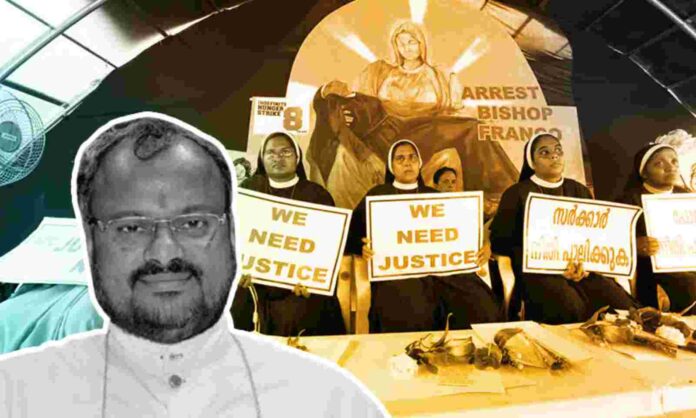A brief look at the judgement of a session court, session case no.457/2019, on the issue of acquitting a person of authority, who allegedly committed sexual assault on a nun/sister who was under his control and administration.
The complainant was then the Mother Superior of St. Francis Mission Home, Kuravilangadu, a convent belonging to Missionaries of Jesus, a congregation of Latin Catholics. The Accused was acquitted of the charges of sexual assault and other offences cited in the complaint.
The accused was the Bishop of Jalandhar Diocese, where the principal seat of the congregation is domiciled. The Mission Home was under the direct control of Jalandhar Diocese. The accused regularly visited Kerala and stayed at the convent. The accused was charged with regularly raping the complainant 13 times on various dates, during his visits.

The judgement of acquittal does not seem to have any sensitivity or knowledge about sexual assault being committed by an institutional head on a subordinate. The evidence shows that the act must have been committed, repeatedly. It does not give weight to the difficulties faced by the nuns to come out and lodge a complaint against a person of high standing such as a bishop in the in the religious institution. It does not examine the root cause of such offences being committed. It has simply ignored and turned a blind eye to obvious facts, given in the evidence, by the victim. The foundation on which misuse of power is easy and committing of offences such as sexual assault is not taken seriously and is not examined. It sends a clear message that the people in power can take for granted that they will be acquitted if they can hide behind a mire of legal maze of controversies and evidences.
Judgements can be appealed against, can be over turned. So to say Judgements could be wrong in their findings is a possibility.
The main point here is the indignity caused to the complainant, the insult and injury and the damage done to the self esteem of the complainant. Can it be erased or damages granted? Is it right on the court to strip the complainant of her dignity publicly?
There is an assumption of stereotyping the facial expression or the conduct of the survivor after having undergone rape. The proceedings detailed in the judgements says that the videos of the functions attended by the Accused and the survivor, shows happy face of the victim/survivor. How relevant is this? Does a trial court determine whether a rape was committed or not by looking at the facial expression of the complainant while attending a public function where she is an important member? The judgement bases its findings on assumed stereo typed presumptions and prejudices against a survivor of rape being a woman.

The Judgement does not stop at the vague and fake allegation of some other relationships, but starts to examine the medical reports and other documents of the physical parts of the complainant, which are not connected with the act of sexual assault of the accused. It goes in detail seeking evidence, regarding whether the complainant had had a third nipple or whether she had an operation removing her third nipple. How relevant is the question of how many nipples the complaint has or had? What has that got to do with the accused having committed rape?
The comments and the examination of the evidence on the body parts of the complainant unconnected with the determination whether the offence of committing of rape or sexual assault on the nun or not, was absolutely uncalled for and demeaning.
The next point is that the judgement does not give consideration to the culture or the vocabulary used by the woman complainant .The important issue of the background of being a nun in the congregation, their way of expressing themselves, the shame and reluctance they feel to narrate an incident committed on their body, their personal space, has been given no importance at all. The language of the nun that she is being forced to ‘share the bed’, is explicit in its meaning that the accused is making her have sex with him forcibly. The judgement states however that “ she just said that, ’she is forced to share bed with him’ and does not clearly in so many words say that he rapes her regularly”. A man gets acquitted on the basis of the woman not having said “he rapes me regularly, but instead said,” He forces me to share his bed.” In most of Indian languages, the meaning when someone says he is asking to share the bed means he wants to have sexual relationship. Even in English when you say, ”will you share my bed, means, will you sleep with me, meaning obviously I want to have sex with you.”
Regarding consent, the judgement recognizes that the Bishop was in a position of authority. Therefore the offence should be considered as aggravated rape, and the burden of proof will thus rest on the accused.
When the consent is forced, when for example, it is a consent whose consent is no consent at all, or when the offender in a perceived position of power, the victim being dependent to be in the institution for his approval, and the victim is afraid, for various reasons, may be because of being in a subordinate position or maybe she considers herself obliged to give consent, or because of the hierarchical position in the institution ,even if she did not raise a hue and cry or complain immediately, or even gave consent, it has to be construed as no consent at all.
Next not giving due credence to the complainant or the witnesses’ statements, the judgement seems to have given the advantage to the accused in contrary to established precedents on rape law. The judgement traverses into the realm of messages and emails. Even the matter of not producing the laptop and mobile phone, involved in the issue is used as irrelevant crutches to acquit the accused.
Finally the judgement meticulously searches for reasons or explanations or grounds for the complaint being filed against the accused, such as the accused being young for such a position of Bishop and therefore attracted negative professional rivalry, internal politics, complaint being inordinately late, the complainant asking to go in for compromise by the other members of the institution are all taken as favorable points to acquit the accused. On every issue adverse inference is drawn against the survivor.





























